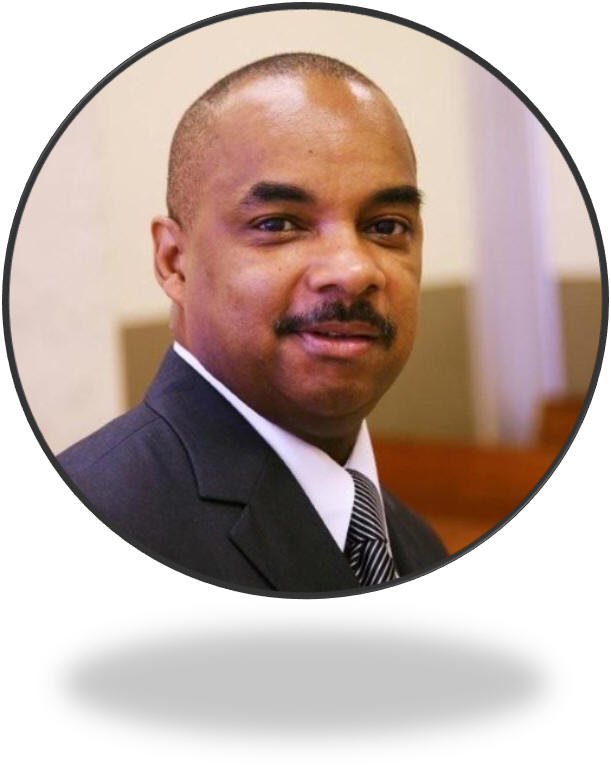
MARTIALFORCE.COM
PRESENTS
AN INTERVIEW WITH
SHIDOSHI GLENN PERRY
SEPT / 2016

Interviewed by Eddie Morales
Martialforce.com
Online Magazine
My name is Eddie Morales and welcome to Martialforce.com Online Martial Arts Magazine. I want to introduce our readers to Shidoshi Glenn Perry, Grandmaster. He and I have known each other since the early 1980's. We met at a place called “The Oriental Sports Center,” which was a Dojo (School) that was operated by a mutual friend by the name of Shihan Freddy Lopez. The school was located on Flatbush Avenue in Brooklyn and many Martial Artist of different styles would go there to exchange ideas and test each other’s fighting ability. His tenacity when practicing was intense and he had an uncanny ability to quickly adapt to any fight situation. His dedication to the Martial Arts became obvious to everyone at the school. His focus is street defense and in my opinion he is technically brilliant and has a true sense of what is needed when dealing with violent attacks on the streets. Shidoshi Perry was always willing to share information and continues to do so with a new generation of practitioners. It is our hope that this interview will shed some light on him as well as the art of ‘Black Dragon Aikijitsu’.
Martialforce.com: To begin this interview, can you tell our readers what is your occupation or profession?
GLENN PERRY: I work as a Special Agent for the Fugitive Recovery Task Force and of course, my heart is in the martial arts. I've been studying and teaching for many years.
Martialforce.com: For those readers that don’t know what a Fugitive Recovery Task force is, can you give us some insight?
GLENN PERRY: I would be happy too. We basically go after and catch all wanted fugitives as a Fugitive Task force focusing on high risk warrants. Once captured we transport all fugitives to jail. Currently, I work primarily on the east coast.
Martialforce.com: Thank you for that explanation. My next question is, when and where did you begin your Martial Arts training and with whom?
GLENN PERRY: I was lucky to start my training early at the Police Athletic League (PAL) located in park place Brooklyn New York in 1966 / 1967. My Father, Clement Perry Sr., was a Marchant Marine and already training in the art of Jiujutsu. He strongly encouraged my brother and I to learn boxing or Jiujutsu, I chose Jiujutsu.
Martialforce.com: How has Martial Arts helped you in your everyday life?
GLENN PERRY: Martial Arts in general has given me good health, coordination, confidence, a sense of wellbeing and many friendships over the years. It’s been a vehicle that enriched my life in many ways and continues to do so.
Martialforce.com: Who in your life influenced you the most regarding Martial Arts and or life in general?
GLENN PERRY: Wow! In the 50 years that I have been involved in martial arts I have trained under some great teachers. Shidoshi Ron Van Clief is still my primary Sensei, and has been for over 45 years. Most of the people I admire are people that I have actually met and trained with on the Tatami (mat)! I'm fortunate to say that I've actually met most of the martial artists I admire. People like; Grandmasters Moses Powell, Ronald Duncan Sr., Peter Urban, George Cofield, Chuck Merriman, Lil’ John Davis, Pierre Rene, and many more. My mentors are Soke S. Papasan Canty, and Grandmaster Rico Guy!
Martialforce.com: Do you believe that there is such a thing as an ultimate or best style and if yes or no, why?
GLENN PERRY: I get this question a lot! There is no best style, no ultimate art! Each art has something to offer. Some arts may be better suited to each practitioner based on their personalities, body type, etc. Martial arts are not stagnant and will change and evolve with the practitioner. Everyone has their own reason for beginning and or practicing any given art and of course these reasons change as we get older and we mature. This change or evolution is what gives you a fulfilling and enriching practice throughout the years.
Martialforce.com: Do you practice or believe in Kata (pre-arranged movements) and if so, why or why not?
GLENN PERRY: Kata is, without a doubt, one of the most important elements of my training which I will never leave out. Kata is like the encyclopedia of whatever art the person trains in, and contains most of the techniques or kihon (basics) of the given style. Kata means different things to different people and should change as we get older. The execution of kata should reflect the personality of the practitioner and not look the same or have the exact same rhythm from one individual to the next. Each practitioner has particular inner elements that influence the movements. Martial Arts should evolve and adapt with the practitioner, as we grow in our arts, we will constantly adjust and control our technique as we mature. A student at the age of thirty years old will not perform technique and kata the same way at the age of sixty. ‘CHANGE IS A CONSTANT!’
Martialforce.com: What kata do you favor, and why?
GLENN PERRY: In truth, I have no favorite as I view the techniques within the Kata as Time and Place. By that I mean there are basic and advance techniques which fit different situations so in essence interchangeable. This affords me a well-rounded method of viewing the mechanical functions of any and all techniques. In answer to your question I love and practice all of the Kata of the systems I have learn and continue to learn from its practice.
Martialforce.com: What are your thoughts on MMA?
GLENN PERRY: First and foremost, I want to say I believe in any form of training because in my opinion it’s all relative. In regards to the Sport of MMA and its beginnings in the UFC, it definitely woke up the martial arts world and changed it forever. Now you have different disciplines fighting in one arena and while there are still rules to abide, it’s still a difficult competition. Of course to truly be effective in MMA or any discipline for that matter, you have to dedicate yourself in every aspect of training be it Physical, nutrition, injury prevention, strength and conditioning and whatever it entails. Throwing a few techniques together from each style without any insight or understanding is not MMA, in my opinion. In regards to the general public participating, it’s a great form of conditioning and I recommend anything that will physically and mentally strengthen anyone.
Martialforce.com: Do you practice or teach weapons and if so what are your thoughts on the purpose of its practice?
GLENN PERRY: Yes, weapons are an extension of the ‘empty hand. I teach weapons at several different levels. For the most part smaller, practical hand held weapons. I also introduce a few traditional martial arts weapons into our training. The ‘katana’ (samurai sword) sai and the nunchaku are also part of our system. The question that comes up often is, what is the purpose of weapons practice if you can’t carry them? There is always a fear factor in facing someone with a weapon but if you practice any weapon diligently you will then embody its weaknesses and strengths, basically its limitations, which in itself is valuable.
Martialforce.com: Can you elaborate?
GLENN PERRY: If a person understands its weaknesses and strengths meaning what you can and cannot do with that weapon then the fear factor will decrease when facing someone on the streets that is using a similar weapon against you. Your mental posture will be strengthened and you will have a greater chance of survival in any violent encounter. It’s one thing to learn a technique that you sometimes practice but it is completely different when you embody the practice to where it becomes who you are as opposed to what you do. I hope that answers your question.
Martialforce.com: Great answer, my next question is, do you believe that Martial Arts is good training for children and why or why not?
GLENN PERRY: Other than the primary benefits of good health, martial arts help children early on in the development of strength, coordination, self-esteem and confidence. I think Martial Arts is an excellent way to instill the virtues of respect, discipline and teaching children how to work with others in a healthy setting. As long as children are guided and mentored under the direction of a qualified instructor, they will benefit from the experience. I don't believe we can fit children into one mold; training should be customized for the individual talent and abilities. The same goes for adults.
Martialforce.com: What can a student expect to learn from you on his or her first day of training?
GLENN PERRY: From the very first day of training new students are introduced to the concepts of ‘Courtesy. Courtesy as it pertains to martial arts, human beings and all living creatures in general. Martial arts are not only used to defend one’s self or to physically harm an attacker. What we practice is also an art which teaches us how to heal one’s self and others in time of need. I do my best to instill in the student a sense of responsibility that comes with training in this wonderful Art. We never stop talking about our responsibility. As martial artists we have to represent our arts with pride, respect and the seriousness it has earned as a viable method of development!
Martialforce.com: What was the experience like going from student to teacher?
GLENN PERRY: Teaching martial arts is a privilege and takes many years of conscious preparation between teacher and student. As a student I was in the dojo with little understanding of what was expected of me as a member of the school. Going from student to teacher was a privilege and honor. When my teacher told me I should open up a dojo and teach his system I was caught by surprise. He explained how to do it and what was expected. Today I am a martial arts student who teaches and I accept that there is no end to learning. My life is dedicated to Martial arts.
Martialforce.com: What has been the hardest obstacle in teaching?
GLENN PERRY: Time and work are the hardest obstacles. These days’ people don’t want to put in the time. They want the rewards now but they don’t think it should take so long and be so hard “Why do we need to do all that”, “why does it takes so long”, “can’t we skip that and go on to what I want to learn?” We are in the generation of ‘YouTubers’ who do not accept the notion of following a way of doing things. No, that’s too hard, there has to be a faster way now! To give a definitive answer to your question, Time and work has been the obstacle but in my opinion, obstacles are put in your way to see if what you want is really worth fighting for. This applies to anything and or everything in life.
Martialforce.com: Do you believe it’s beneficial to study with different instructors or systems and if so, why?
GLENN PERRY: Yes, once a good foundation is reached, along with a good understanding of the basic principles of martial arts. Strong basics are the key and without that you are wasting your time. In general cross training is very beneficial for short term goals as well as long-term goals for students and instructors. My belief is that there is no one answer or way. The system I learned incorporates many aspects of different systems which affords me a more comparative view on technique and execution thereof.
Martialforce.com: How does your current Karate training vary from when you first started?
GLENN PERRY: It took a long time for me to understand that we are connected as martial artists even in different systems. Back in the day I trained with less purpose not thinking of the time or how long I was going to train. The training was physically brutal to match whatever I may confront on the street. Now I train for longevity, with a purpose and not just self-defense or to perfect punches and kicks. I find myself training for my health, wellbeing and because this is my lifelong passion!
In addition, another gain from training is, Insight, your insight is different when you begin training because all you see and do is the physical aspect. As you progress the practice becomes more situational or specific to the needs of the moment. You develop different scenarios for future confrontation. Insight from embodiment of the system and its technical aspects can only be gained through time and diligent practice.
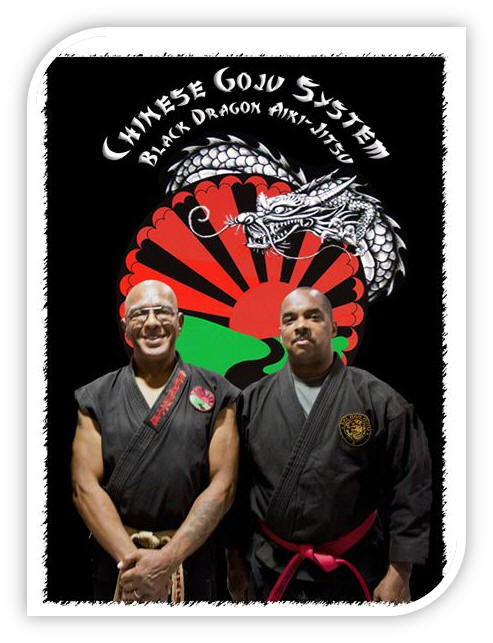
Martialforce.com: What are some of the things you are the most proud of throughout your martial art career?
GLENN PERRY: This is a hard one because I don’t know if ‘proud’ is the word, but it makes me feel blessed to know that most of the people I grew up with and trained with in the dojo are still my close friends and family! I have shared my experiences and taught many people over the years. I know I owe so much to those who came before me and I’m trying to give back to the martial arts community in my own little way. In regards to students, I have several students who have been training with me for as long as 40 years and still continue. The organization is strong and we are all still training.
Martialforce.com: Can you tell our readers what are your long-term plans in regards to teaching and practice of martial arts?
GLENN PERRY: I’m interested in teachers, dojo leaders and students interested in a fellowship and sharing training tools for the betterment of its members. Each member in this Association would commit to visit dojos within the membership, shared information, and help promote each other’s martial arts related events.
Martialforce.com: After many years of study you became the inheritor the ‘Black Dragon Aiki-jutsu system’ founded by your teacher. Can you tell our readers about this and what your future goals are?
GLENN PERRY: Well before my teacher officially retired he helped me prepare for the next phase of my journey. After all his hard work and all the people who passed through over the years he didn’t want to see the system disappear. I, along with senior members, will continue the legacy and add to what we have learned to the art. My most immediate goals are to preserve the arts of Chinese Goju and Black Dragon Aikijutsu, continued training, while documenting the evolution, beginning to the present and sharing it with the world. Together we are going to continue to train, organize into larger groups in the US and establish smaller schools internationally.
Martialforce.com: Yes I recall in the early 1980s you were in the process becoming a Chief Instructor for your teacher’s organization.
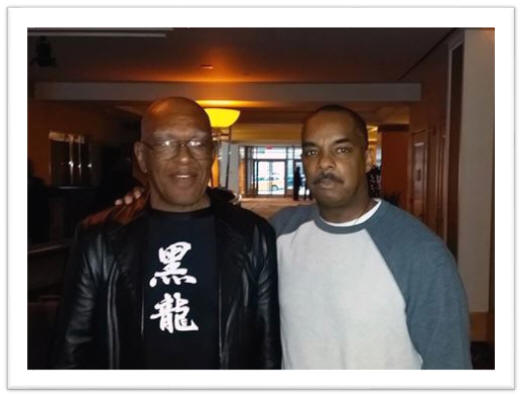
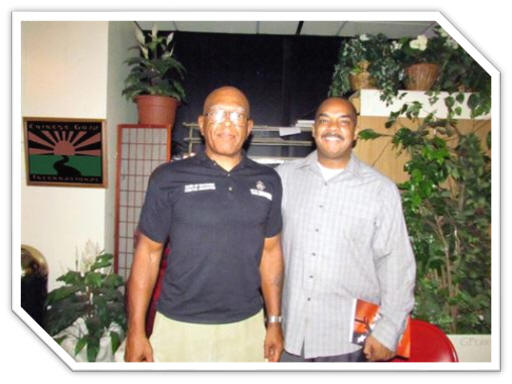
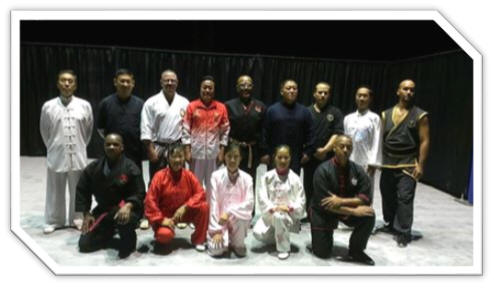
GLENN PERRY: Continues: I have been studying martial arts since I was a child and have continued different styles under very well-known Sensei's and Grandmasters. During this time I have been very fortunate to visit other schools, and even share dojos with other talented Sensei from other styles. My main focus has always been on the arts of Jujutsu and Karate-Jitsu. As I get older in life I I feel the strength of maturity in my practice. I have come to believe that martial arts continues to evolve as the individual grows. Boxing, Karate, Ju-Jutsu, Kung Fu, etc, today, everybody knows something. It not like it was in the 1950s, 60s or 70s. The first thing that comes to mind is the legal responsibility involved in the justification of force when defending yourself from an attacker. You can actually go to jail for defending yourself and using what is deemed as excessive force.
In this day and age if all you can to do is block, kick, punch, brake bones, and that’s all you teach, what’s the message? I just don’t see the point! Most martial arts teachers have been training and teaching for twenty-five years and more. How long does it take for a student to become proficient enough to feel confident, with enough technique and the important people skills to defend themselves or, better yet, avoid confrontation altogether? Yes, we also have to teach conflict resolution strategies in martial arts!
I teach Aiki-Jujutsu, an art of special tactics, self-defense and self-awareness that people can use before, during and after a physical confrontation. It would be difficult to enjoy a meal at a restaurant with your family after defending yourself when your pants are ripped, got some blood on your shirt, etc.. Even if you and your family are not hurt other make it home, nothing will ever the same.
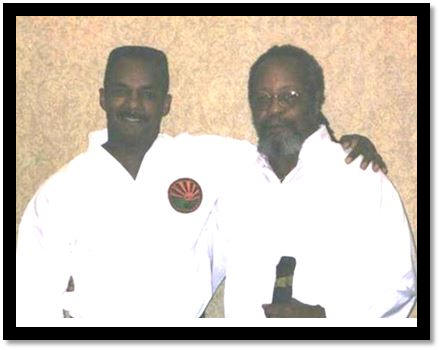
Glen Perry and Grand Master Chaka Zulu
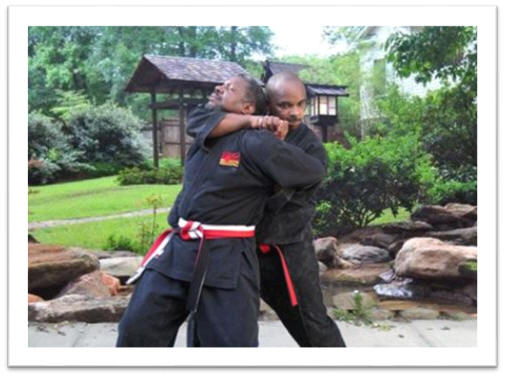
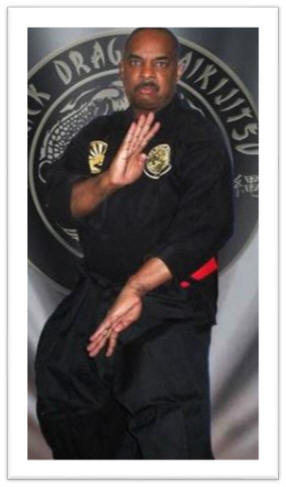
Martialforce.com: Do you believe that tournament competition is good for students and if so, why or why not?
GLENN PERRY: Competition, the testing one’s self against others, being evaluated under pressure, all necessary components of martial arts training! Competition in moderation, fighting, kata and weapons, each balanced as tools of training is very good for the practitioner. The martial arts student should be well rounded and participate in tournament fighting, kata and the ability to demonstrate controlled application of techniques. And, of course, the ability to demonstrate practical application of martial arts weapons is also a necessary component at intermediate and advanced levels.
Martialforce.com: What are your thoughts on cross training in weights, running?
GLENN PERRY: Training smart, in moderation, changing the tempo a bit definitely should involve cross training. I love the idea of cross training. Resistance training, swimming, gymnastics, etc. Just like cross training in different martial arts from time to time. I like that too… it makes sense!
Martialforce.com: What is the one thing that you feel is most overlooked in Martial Arts in general and why do you think it deserves attention?
GLENN PERRY: In my opinion there are a few things overlooked or just flat out ignored. The first being, respect and honor. Respect for instructors and those that have trained before you and honor in what you do and how you conduct yourself. Back in the early days of training there were students that would show up early to class. These handful of students would go the extra mile to learn every facet of the art. They would stay for years with their instructor demonstrating another element which seems to be lost these days. That element is called Loyalty! Their passion for the art and respect for instructor was undeniable, moreover, untouchable. While it is a good thing to train with different styles and schools of thought, back in my day we asked our instructor for permission and got his or her blessing. To truly understand, you must embody and if you don’t have the discipline or passion you will never reach that point and your training and life for that matter will be a series of half steps. Someone once said “Martial Arts is more than just a punch or a kick” but it isn’t until you reached that point in your training that you begin to understand this and unfortunately, some never do.
Martialforce.com: Can you tell our readers a little about each of the instructors you mentioned and what you gained from their teachings?
GLENN PERRY: I consider myself to be very lucky. I have met so many talented martial artists. Many of my teachers are leaders and founders of their own martial arts systems. Anthony Muhammad, Anton Muhammad, William Oliver (R.I.P.), Steve Malonoski, Ric Pesetta (R.I.P.), Tony Morrison, Robert Crosson, Ernest Hyman Sr., Eddie Banks aka Sharrieff Nashid, Freddie Lopez, Taimak, Tony “Symion”, Derrick Williams, Abdul Aziz, Irma Guerrero, Gloria DuBisset, Harry Morton (R.I.P.), Tanka Ramos, Sup Kim, you (Eddie Morales) and many others.
Al Govine, Sensei (R.I.P.): A soft-spoken, gentle Jiu-Jutsu teacher and educator. He was also called “The Coach”. He created an environment of training not focused on rank, but on hard work on the mat, civil responsibility and the building of character.
Toyotaro Miyazaki, Sensei: One of the best!
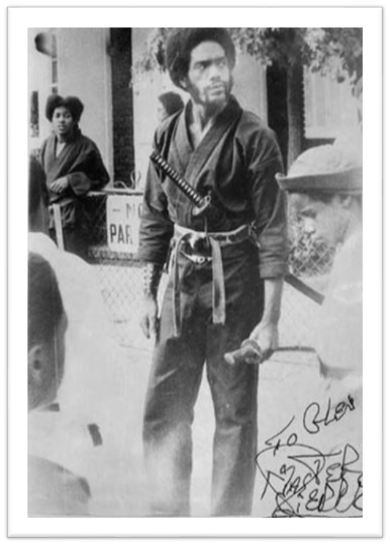
Early photograph of Professor Pierre Rene
Pierre Rene, Professor: I began training with him as a child and the year was approximately 1970. I have been with him since those early days of training and I continue a close relationship with him to this day. He believed in cross training in systems in regards to Shotokan Karate and the Chinese arts. He is a man of many talents, a nothing is impossible attitude! Professor Rene was committed to his education, studying in college during the day and teaching Karate six nights a week. Not many people knew that he was into books and training young warriors at the same time. Professor Rene has students that have been with him for over 40 years. Some of them have their own dojos and remain with him, under his banner today. Teacher, diplomat and educator all in one, the Professor!
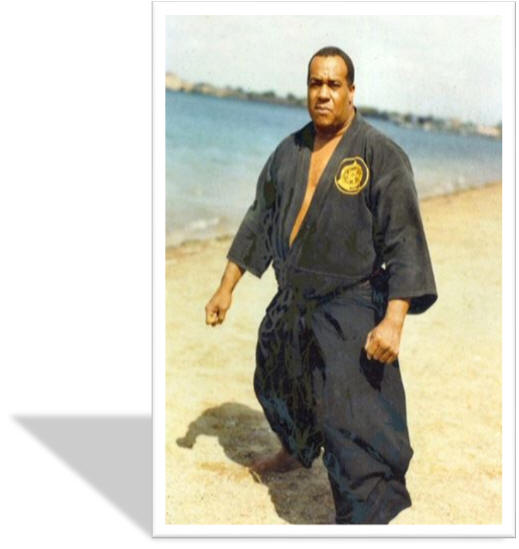
Moses Powell
Moses Powell, Supreme Grandmaster/ ‘Doc’: The legend, a thinker, the teacher’s teacher! ‘Doc’ possessed the most incredible repertoire of spontaneous technique I have ever seen in my life! To see him execute a technique was to see genius in motion. To be ‘touched’ by him is to never forget the experience! He said to me, “you are welcome to get on the mat with us, but you better believe this is not a game!”
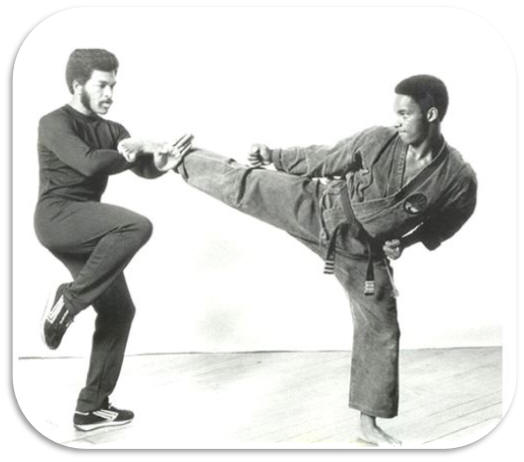
Ron Van Clief and Glenn Perry
(Circa 1977)
Ron Van Clief, Grandmaster: I am a first generation disciple of Grand Master Ron Van Clief and trained in his systems for approximately 45 years. Shidoshi Van Clief is a perfectionist, hard core, tough Marine old-school methods. His concept of training prepares his students for life! Borderline obsessed, he lives, eats and breaths his arts of Aiki-jitsu, Chinese Goju and even Gracie Jujutsu now! Whenever you interact with Grandmaster Van Clief in the dojo it’s a lesson. Doesn’t matter who you are or what level you hold! His dedication and commitment to his art is inspirational. Really believes that there is nothing else in life so he keeps going!
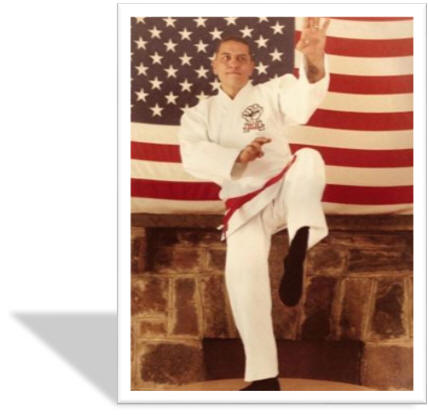
Peter Urban
Peter Urban, Sensei: Pioneer, everything he did was related in some way to a martial arts lesson. There was no conversation or hobby that wasn’t connected in some way to training. Some of his best lessons took place over a game of chess. My teacher used to take me to Sensei Urban’s Thursday black belt classes on 17th Street in Manhattan. When Sensei Urban shut the doors and closed the windows you knew what time it was! I was a young teenager and not allowed to talk! This man helped me understand my responsibilities as a student and teacher!
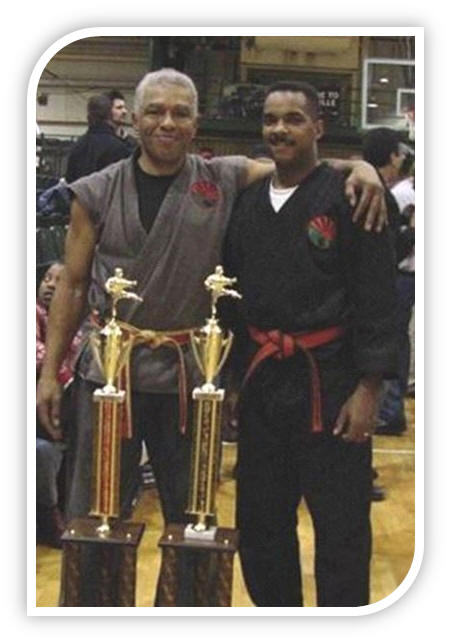
Grand Master Ron Van Clief and Soke Glenn Perry in 2001
Martialforce.com: Do you have any plans to write a book in regards to your art?
GLENN PERRY: Yes, I’m working on finishing touch on two books, ‘Martial Arts in North America: the First 100 Years’ and co-writing the book ‘Black Heroes of the Martial Arts Vol II’, with Grandmaster Ron Van Clief. Each of the book will be in hardcopy and available as online e-book downloads. We are also working on revised editions of the ‘Manual of Martial Arts’ and the ‘Ron Van Clief Guidebooks’, more photographs and updated information.
Martialforce.com: What do you hope to accomplish in the next few years in Martial Arts or personal life?
GLENN PERRY: I just hope to leave enough information and material to help other martial artists reach their goals. I’m going to do the work, not by myself and not for myself but for anyone who wants to follow the path of martial arts. I want to make my parents and teachers to be proud! I wore the ‘patch’, I learned something and passed it on to others…. There are no secrets!
Martialforce.com: Fantastic, well thank you for this interview and we here at Martialforce.com wish you all the success in the world.
GLENN PERRY: Thanks for the opportunity to sit with you and your readers again. I thank you for your friendship and for the support over the years!
Zen Garden in Cuernavaca, Mexico, 1999:
Shidoshi Ron Van Clief, founder of The Chinese Goju System
promotes Glenn Perry in rank and bestows upon him for the
first time in our systems the title 'SOKE' of the Chinese Goju
System and Black Dragon Aikijitsu.